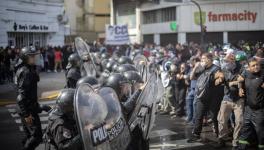Milei Declares war on Argentine Working Class With Presidential Decree

The Decree of Necessity and Urgency 70/2023 announced by President Javier Milei on Wednesday December 20, proposes significant changes to the country’s labour regime,
The Decree of Necessity and Urgency (DNU) 70/2023 announced by President Javier Milei on Wednesday December 20, proposes significant changes to the country’s labor regime, amid the proposed modification of more than 300 regulations. In addition, it advances a profound deregulation of the economy, proposes a “shock stabilization plan,” and aims to advance the privatization of public companies.
There are at least 11 labor laws that the decree affects. Firstly, there are more than 20 modifications to the Employment Contract Law 20,744, which determines the regime for hiring workers in the country as a basis for the rights and obligations of the parties.
Prohibition of stoppage of activities
In Chapter IX of the DNU signed by Milei, the concept of “essential services” is outlined and the possibility of strikes in almost all activities is eliminated. The DNU establishes the obligation to provide at least half of the services during an industrial action, in the case of certain activities considered of essential importance.
Regarding the provision of minimum services, in the case of essential services, in no case may you negotiate or impose on the parties a coverage of less than 75% of the normal provision of the service in question.
In the case of activities or services of transcendental importance, in no case may coverage of less than 50 percent be negotiated or imposed on the parties.
The following activities will be considered essential services in the strict sense:
- Health and hospital services, as well as the transportation and distribution of medicines and hospital supplies and pharmaceutical services;
- The production, transportation and distribution and marketing of drinking water, gas and other fuels and electrical energy;
- Telecommunications services, including internet and satellite communications; Commercial aeronautics and air and port traffic control; including beaconing, dredging, mooring, stowage and towing of vessels;
- Customs and immigration services, and others linked to foreign trade; and
- child care and education levels: daycare, preschool, primary and secondary, as well as special education.
The following are considered activities of transcendental importance:
- Production of medicines and/or hospital supplies;
- Maritime, river, land and underground transportation of people and/or merchandise through the different means used for this purpose;
- Radio and television services;
- Continuous industrial activities, including steel and aluminum production, chemical activity and cement activity;
- Food industry throughout its value chain;
- The production and distribution of construction materials, aircraft and ship repair services, all port and airport services, logistics services, mining activity, refrigeration activity, mail, distribution and marketing of food and beverages, agricultural activity and its supply chain worth;
- Banking, financial services, hotel and gastronomic services and electronic commerce; and
- The production of goods and/or services of any activity, which were affected by export commitments.
Work trial period
The amendment extends the trial period for any employee from three to eight months. “Any party may terminate the relationship during this period without giving cause, without the right to compensation due to the termination, but with the obligation to provide advance notice,” establishes article 71 of the DNU.
Compensation
Article 81 of the DNU is the one that establishes the modifications in the compensation regime for seniority or dismissal. The amount of compensation for dismissal without just cause is reduced from two to one month’s salary for each year of service or fraction greater than three months.
The DNU establishes the possibility that employers “may choose to contract a private capitalization system at their cost, in order to pay for the compensation provided for in this article and/or the sum freely agreed between the parties in the event of termination by mutual agreement
In addition, the parties may replace this compensation regime with a labor termination fund or system, the cost of which will always be borne by the employer, with a monthly contribution that may not exceed 8% of the eligible remuneration.
Overtime pay
According to article 79, “collective labor agreements (…) may establish regimes that adapt to changes in production methods, the conditions of each activity.”
For this purpose, the overtime regime, bank of hours, compensatory francs, among other institutes related to the working day, may be collectively available.”
The “hour bank” allows companies to take monthly work hours (or annual days) and distribute them how they want.
New causes of dismissal
In article 80, the “just causes” for dismissal are modified and it is indicated that “participation in blockades or takeovers of establishments constitutes serious labor injury; “serious injury is presumed to exist during a direct action measure.”
Likewise, when “the freedom to work of those who do not adhere to the measure of force is affected, through acts, facts, intimidation or threats; and the entry or exit of people and/or things to the establishment is totally or partially prevented or obstructed.”
Changes in the law on private homes and agricultural work
Regarding private homes, article 50 of the Private Home Personnel Law No. 26844 was repealed, which aggravated the compensation for dismissal when the employment relationship is not registered.
Meanwhile, for rural personnel, article 15 of Law 26,727 on agricultural work was repealed, which prohibited the performance of outsourced companies in the sector’s regime.
Other changes
The modification of the employment contract law makes changes for the benefit of the employer sector:
- Repeals article 132 bis, which sanctions companies that withhold contributions from the worker destined for social security organizations, or workers’ professional associations, and does not pay those amounts in favor of the organizations or entities to which they were destined.
- Repeals article 80, which sanctions companies that do not provide proof of employment to employees when the employment relationship ends.
- Modifies article 23, by which the presumption of existence of an employment contract is eliminated when invoices are issued as “monotributistas”, legalizing this form of job insecurity.
- It modifies article 242, incorporating as a presumption of serious injury by the worker and just cause for dismissal, the exercise of the right of smell. That is to say, indirectly, the constitutional right to strike is violated, punishable by dismissal without compensation for workers who exercise it.
- It incorporates article 245 bis, by which it authorizes the company, through the payment of compensation, to carry out discriminatory dismissals “for reasons of ethnicity, race, nationality, sex, gender identity, sexual orientation, religion, ideology, or opinion political or union.”
- It modifies article 277, allowing the company convicted in a labor trial to pay compensation in twelve installments.
What’s next?
The DNU will now proceed to Congress. The Chief of Staff has 10 days to send the DNU to the Permanent Bicameral Commission for Legislative Procedures of Congress. If the Commission does not issue an opinion on the DNU, the chambers can discuss it ex officio. Congress can only accept or reject the DNU, it cannot make modifications, amendments or additions.
If no chamber deals with it, the DNU remains in force. If only one chamber rejects it, but the other accepts it, it remains in force. If both chambers reject the DNU, it ceases to be in force.
The other power that can be issued on the DNU is the Judicial Power, which does have the possibility of rejecting separate articles or the entire norm. The president of the Supreme Court, Horacio Rosatti, already warned a few days ago that the measures announced by President Javier Milei “would fall within what constitutional law calls an emergency,” a situation that is outlined in the National Constitution, and demarcates the power of the highest court around “constitutionality control.”
“Everything seems to indicate that this mega-DNU would have been prepared by private legal firms. Second alarm, as serious as the first: who created this DNU? If they were private legal firms, it is very serious and cannot be allowed or normalized,” Vilma Ibarra, a lawyer and former senator, wrote on her networks, alerting another irregularity of origin that could lead to the DNU facing legal challenges.
On the other hand, there remains the political and social aspect, that is, the response to the DNU. The General Labour Center (CGT), the CTA, the Union of Workers of the Popular Economy (UTEP) and unions in particular (such as Banks) have come out to reject the DNU and declare themselves in a state of alert. Governors such as Axel Kicillof from Buenos Aires to Sergio Ziliotto from Pampa, to the Justicialist Party (PJ), to Peronist leaders, from the ARI and the left, have repudiated the massive deregulation of the economy.
Get the latest reports & analysis with people's perspective on Protests, movements & deep analytical videos, discussions of the current affairs in your Telegram app. Subscribe to NewsClick's Telegram channel & get Real-Time updates on stories, as they get published on our website.
























